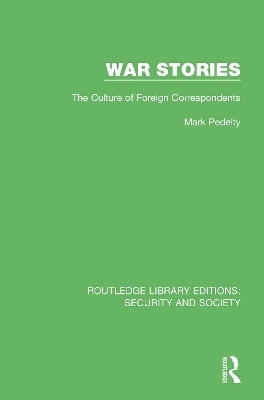
War Stories
The Culture of Foreign Correspondents
Seiten
2020
Routledge (Verlag)
978-0-367-56993-8 (ISBN)
Routledge (Verlag)
978-0-367-56993-8 (ISBN)
What are the influences on war correspondents as they report on news in war-torn countries? Originally published in 1995, Mark Pedelty explores the lives, work and culture of an international press corps. He writes about the reporters who covered El Salvador’s civil war. Going beyond those specifics to look at the institutions, practices, myths, and rituals that pattern the work of journalists everywhere. He tells us the stories of war correspondents at work and at play, as they cover the news.
The myth, developed in part from the movies we watch and from CNN, is that war is reported from the front lines. More often, it is reported from the front office as journalists sit around waiting for something "big" to happen. Pedelty looks at the context in which they construct their reports. "Unnamed" diplomats in the US Embassy feed stories to reporters, who are careful not to alienate these crucial sources by adding background information that might be perceived as ideological. Reporters are also constrained by the pens and preferences of editors who work to narrow the focus of news reporting, removing necessary context in the process. By examining how news stories are actually produced, Pedelty highlights the elusiveness of the goal of "objective" journalism. We see how the biases of war correspondents are connected to structures of power, and how these biases affect actual journalistic practices.
Pedelty also explores alternative possibilities for war reporting, including emerging alternative international news services and ways to deepen reporters’ understandings of the countries and problems they cover.
Influenced by anthropology, communication studies, cultural studies, and sociology, this book will interest scholars and students in those fields, as well as journalists and anyone who watches, reads or listens to news.
The myth, developed in part from the movies we watch and from CNN, is that war is reported from the front lines. More often, it is reported from the front office as journalists sit around waiting for something "big" to happen. Pedelty looks at the context in which they construct their reports. "Unnamed" diplomats in the US Embassy feed stories to reporters, who are careful not to alienate these crucial sources by adding background information that might be perceived as ideological. Reporters are also constrained by the pens and preferences of editors who work to narrow the focus of news reporting, removing necessary context in the process. By examining how news stories are actually produced, Pedelty highlights the elusiveness of the goal of "objective" journalism. We see how the biases of war correspondents are connected to structures of power, and how these biases affect actual journalistic practices.
Pedelty also explores alternative possibilities for war reporting, including emerging alternative international news services and ways to deepen reporters’ understandings of the countries and problems they cover.
Influenced by anthropology, communication studies, cultural studies, and sociology, this book will interest scholars and students in those fields, as well as journalists and anyone who watches, reads or listens to news.
Mark Pedelty
Acknowledgments. A List of Acronyms. Introduction: Reporting Salvador Part 1: War and Identity 1. War Games 2. Terror and Control 3. On a White Horse Part 2: Structure and Practice 4. A Team, B Team 5. Discipline and Publish 6. The Source War 7. Practice 8. Recreational Rituals 9. War Photography Part 3: Text and Representation 10. The Narrative Structure and Agenda of Objective Journalism 11. Peace Comes to Television Part 4: Difference and Domination 12. Alonzo’s Dream 13. The Salvadorans of SPECA 14. Alternatives. Conclusion: Leaving the Camino. Epilogue. Appendix: The Journalists. Notes. References. Index.
| Erscheinungsdatum | 15.01.2021 |
|---|---|
| Reihe/Serie | Routledge Library Editions: Security and Society |
| Verlagsort | London |
| Sprache | englisch |
| Maße | 156 x 234 mm |
| Gewicht | 657 g |
| Themenwelt | Geisteswissenschaften ► Geschichte |
| Sozialwissenschaften ► Ethnologie | |
| Sozialwissenschaften ► Kommunikation / Medien ► Journalistik | |
| Sozialwissenschaften ► Kommunikation / Medien ► Medienwissenschaft | |
| Sozialwissenschaften ► Soziologie | |
| ISBN-10 | 0-367-56993-0 / 0367569930 |
| ISBN-13 | 978-0-367-56993-8 / 9780367569938 |
| Zustand | Neuware |
| Haben Sie eine Frage zum Produkt? |
Mehr entdecken
aus dem Bereich
aus dem Bereich


